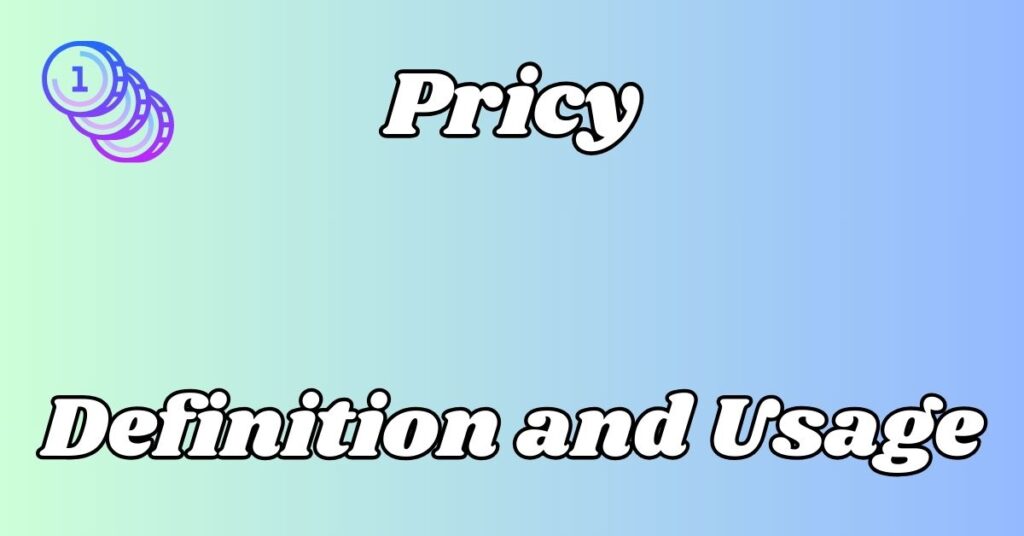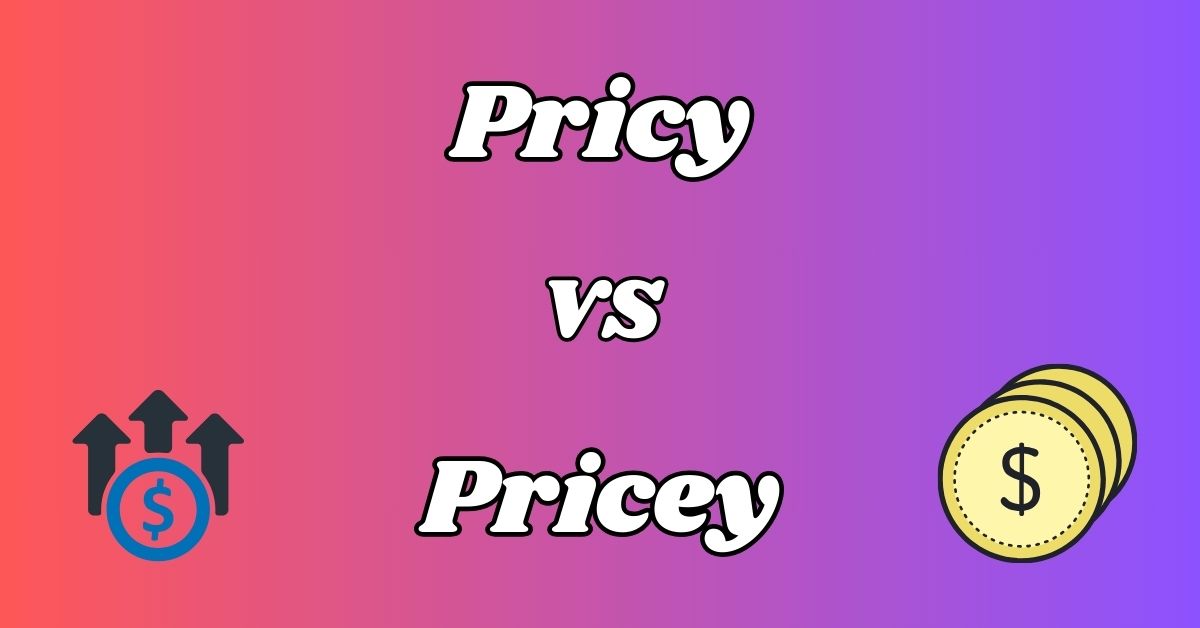Pricy or Pricey refer to items that cost a lot, but they have different connotations and usages. In today’s fast-paced world, where language evolves rapidly, understanding the nuances between these two words can enhance your communication skills.
While pricey is the more widely accepted spelling in American English, pricy is frequently used in informal contexts.
This article will explore the definitions, origins, and proper usages of pricy and pricey, helping you navigate their differences. By the end, you’ll feel confident using these terms correctly in your writing and conversations, ensuring your message is clear and effective.
Quick Summary
Pricey is the more widely accepted spelling in American English, while pricy is often used informally. Both words describe items that are expensive, but knowing when to use each can improve your communication skills. In this article, we will delve into the definitions, usages, and nuances of both terms.
Understanding Pricy or Pricey

The words pricy and pricey both indicate high cost or expense. However, pricey is generally considered the standard spelling in most dictionaries and is more commonly used in formal writing.
In contrast, pricy tends to appear more in casual conversations or informal contexts. Understanding these distinctions can enhance your vocabulary and help you express yourself more clearly.
New Trend in the English Language
Language is always evolving, and the preference for one spelling over another reflects broader changes in society. The rise of digital communication has led to a trend where informal language becomes more accepted.
As younger generations, like millennials, communicate through texts and social media, they often favor shorter or simpler forms of words. This shift has contributed to the growing acceptance of pricy, even though it may not be as widely recognized in formal contexts.
Formation of Adjectives by Adding Suffix -y
In English, we often form adjectives by adding the suffix “-y” to nouns. This practice allows for greater flexibility in expression. For instance, we take the noun “price” and turn it into an adjective by adding “-y,” resulting in “pricey.”
This method of word formation is common in everyday language and helps convey nuances in meaning.
Pricy: Definition and Usage

Pricy is an informal adjective used to describe something that feels overpriced or excessively costly. It often carries a subjective tone, suggesting that the price exceeds what one might consider reasonable. For example, you might say, “That new smartphone is quite pricy,” indicating your opinion about its cost.
When we transform words into adjectives using “-y,” we create terms that convey feelings or opinions about those nouns. In this case, “pricy” implies a judgment about the price of an item rather than just stating its cost.
Pricy Definition
Pricy revolves around its informal usage to describe something that seems too expensive for what it offers. It often suggests that consumers feel they are paying more than what an item is worth.
Words into Adjectives
This term can be derived from the noun “price,” following the common pattern of transforming nouns into adjectives by adding “-y.” This linguistic structure allows speakers to express opinions about costs effectively.
Pricy Usage
You might say, “The new restaurant downtown is quite pricy,” which conveys your perception that dining there costs more than you’d expect for a casual meal.
Pricey: Definition and Usage

Pricey is an adjective used to describe something that costs a lot of money. It implies that the item or service is expensive, but it doesn’t necessarily mean it is overpriced. Often associated with quality, pricey can refer to luxury goods, fine dining, or high-end services that justify their cost. Understanding this term helps convey value in discussions about expenses.
Pricey Definition
The definition of pricey indicates a higher cost associated with an item or service without suggesting that it is unjustifiably expensive. It often conveys a sense of worth, implying that the quality or experience justifies the price tag attached.
Words into Adjectives
The term pricey derives from the noun “price,” following the common English pattern of forming adjectives by adding the suffix “-y.” This transformation allows speakers to express opinions about costs effectively, making it easier to describe something as having a high monetary value.
Pricey Usage
Using pricey in conversation or writing, it often highlights both cost and quality. For example, you might say, “The hotel is pricey, but the amenities are exceptional.” This usage emphasizes that while the price is high, the value received is worth it.
Understanding how to incorporate pricey effectively enhances clarity and conveys your perspective on expenses.
How To Use Pricey in a Sentence
Using “pricey” effectively enhances clarity in your writing and speaking. For example, “The designer shoes are pricey due to their craftsmanship” communicates both cost and value clearly. This sentence illustrates how context matters when discussing costs associated with items.
Synonyms of Pricey
When looking for alternatives to describe high costs, consider these synonyms for pricey:
- Expensive
- Costly
- High-priced
- Dear
- Overpriced
- Lavish
- Premium
- Exorbitant
- Steep
- Upscale
These synonyms can help diversify your vocabulary when discussing costs or value perceptions.
Side by Side Comparison
To further clarify the differences between pricy and pricey, here’s a comparison table:
| Term | Common Usage | Informal Usage | Regional Preference |
| Pricy | Less common | More informal | British English |
| Pricey | More common | Standard | American English |
This table shows how each term fits into different contexts and regions.
Everyday Usage Examples

Using pricy and pricey in everyday conversation can improve your communication skills. Both terms describe high costs, but their contexts may differ. For instance, pricy often appears in informal discussions, while pricey is more common in formal settings.
By incorporating these words into your vocabulary, you can express opinions about costs more effectively and accurately.
Pricy Example
Using pricy might be, “The concert tickets are a bit pricy this year.” This sentence conveys a personal opinion about the cost, suggesting that the speaker feels the tickets are too expensive compared to previous years. Using pricy here adds a casual tone to the remark.
Pricey Example
In contrast, a sentence like, “That designer handbag is quite pricey,” illustrates how to use pricey in a more formal context. This statement acknowledges the high cost while implying that the quality or brand justifies the expense.
It conveys respect for the item’s value and helps communicate a more polished perspective on spending.
Related Confused Words
When discussing high costs, terms like pricey, expensive, and costly often create confusion. While they all refer to items that require a significant amount of money, each word carries slightly different connotations.
Understanding these distinctions can help you choose the right term based on context, enhancing your communication and ensuring your message is clear.
Pricey vs Expensive
The difference between pricey and expensive lies mainly in connotation. While both terms indicate a high cost, expensive often feels more formal and objective. In contrast, pricey carries a more subjective tone, suggesting personal feelings about the cost.
This nuance can influence how you express opinions about various products or services in conversation.
Pricey vs Costly
Comparing pricy and costly reveals subtle distinctions. Both words indicate high prices; however, costly may imply significant financial implications beyond just being expensive.
For example, something that is costly might also suggest a burden on one’s budget. Understanding these differences allows for more precise language when discussing expenses and value perceptions.
Read More Article: Payer vs Payor: What’s the Difference?
FAQs: Pricy or Pricey
How do you write pricey?
You write it as pricey, which is the more widely accepted spelling in American English.
How do you use pricey?
You can use pricey to describe something that is expensive, for example, “The restaurant is pricey but offers excellent food.”
Is pricy a formal word?
No, pricy is considered informal and is often used in casual conversations.
Is it pricey or pricy?
The correct term in standard American English is pricey, while pricy is an informal variation.
Conclusion
Understanding the distinction between pricy and pricey is essential for effective communication. While both terms describe high costs, pricey is the more widely accepted spelling in American English, often used in formal contexts.
On the other hand, pricy tends to appear in casual conversations. By recognizing these nuances, you can enhance your vocabulary and express yourself more clearly. Whether discussing luxury items or everyday purchases, using the correct term pricy or pricey will ensure your message resonates with your audience.
Related Post: Witness’ or Witness’s: Which One is Correct?

